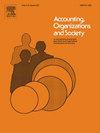The importance of information flow within auditors’ client portfolios to audit quality
IF 3.6
2区 管理学
Q1 BUSINESS, FINANCE
引用次数: 0
Abstract
We extend prior research by exploring the importance of information flow within auditors’ client portfolios to audit quality. On the one hand, information flow fosters communication among clients concerning how to deal with an auditor, helping clients negotiate against proposed audit adjustments. On the other hand, information sharing helps spread indications that an auditor provides a low-quality audit to one client, making such signals known to their other clients. Accordingly, this motivates auditors to impose stricter external monitoring to protect their reputations and wealth. In analyzing which force dominates in shaping audit quality, we find that companies experience a higher likelihood of audit adjustments and a lower likelihood of accounting irregularities when their audit committee members are socially connected or interlocked with audit committee members of other clients audited by the same auditor. In contrast, we do not find any perceptible impact of informational connections stemming from top management on audit quality, consistent with executives not always demanding accounting transparency. Mechanism analysis reveals that auditors expend more effort on engagements when clients have more extensive information flow channels.
审计师客户组合中的信息流对审计质量的重要性
我们通过探索审计师客户组合中的信息流对审计质量的重要性来扩展先前的研究。一方面,信息流促进了客户之间关于如何与审计师打交道的沟通,帮助客户就拟议的审计调整进行协商。另一方面,信息共享有助于传播审计人员向一个客户提供低质量审计的迹象,使其他客户知道这些信号。因此,这促使审计师实施更严格的外部监督,以保护自己的声誉和财富。在分析哪一种力量在塑造审计质量方面占主导地位时,我们发现,当审计委员会成员与同一审计师审计的其他客户的审计委员会成员有社会联系或相互联系时,公司审计调整的可能性更高,会计违规的可能性更低。相比之下,我们没有发现来自最高管理层的信息联系对审计质量有任何可察觉的影响,这与高管并不总是要求会计透明度相一致。机制分析表明,当客户拥有更广泛的信息流渠道时,审计师在业务上花费的精力更多。
本文章由计算机程序翻译,如有差异,请以英文原文为准。
求助全文
约1分钟内获得全文
求助全文
来源期刊

Accounting Organizations and Society
BUSINESS, FINANCE-
CiteScore
7.80
自引率
6.40%
发文量
38
期刊介绍:
Accounting, Organizations & Society is a major international journal concerned with all aspects of the relationship between accounting and human behaviour, organizational structures and processes, and the changing social and political environment of the enterprise.
 求助内容:
求助内容: 应助结果提醒方式:
应助结果提醒方式:


